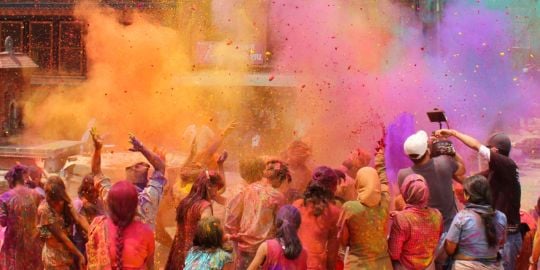Hello,
Before moving to India, it is important to investigate the cost of living in the country.
As we did in 2015, we give you the opportunity to share your experience and tell us more about products and services average recorded prices in your town/city/area.
Don't hesitate to let us know if the cost of living in India has decreased or increased in the past few years.
Thanks to your help, would-be expatriates will have the opportunity to refine and better prepare their expatriation project.
> How much does it cost to rent an apartment/house in India?
> How much do you pay for your public transport tickets (bus, subway, train, tram)?
> Staple food: what do people eat and how much do they pay for basic food like bread, rice or pasta?
>What is your monthly grocery budget?
> How much does it cost to see a physician/doctor/specialist in India ?
> What is your children's schooling monthly budget?
> How much does it cost to fill up your car's fuel tank?
> How much do you pay for electricity/gas/water etc.?
> How much do you pay for your Internet/phone subscription?
> How much do you pay for your lunch pack on weekdays?
> How much do you pay for an espresso coffee?
> How much do you pay for a cinema ticket?
> How much does a gym membership cost in India?
Thank you everyone!
Priscilla
Cost of living in India - 2017
Hello all!
India is still a relatively cheap place to live, depending on what standard of living you are used to and comfortable with. I live in Bangalore, which has a lot of Expats and a higher standard of living thanks to its IT sector. My flat is a 1BHK (meaning a one-bedroom apartment with a hall and a kitchen) and it costs around USD 250 per month. Meals can be had for as cheap as a few dollars to as expensive as what one would find in a New York or London. Alcohol runs about Rs. 100 for a 500ml bottle of beer at the store to Rs. 350 for a pint at one of the local brew pubs. My phone costs around Rs. 1,000 per month and Internet another Rs. 2,000. Travel costs really depend on the destination and level of comfort you're looking for, but the trains are cheap and a great way to see the country.
One can easily live off of a salary of around USD 1,000 per month, though the more money you make, the more fun you can have 
India is cheaper than other counties the world. I spent 7 years in Bangalore, Karnataka state. Now in us.
Phone bill including 2gb internet from DoCoMo = 500 rp
1 bhk rent =8000 rp monthly in marathahalli
Gym membership =250 rp to 500 rp
1 small cup of tea = 5rp
Travel fares depend on whether you use the train (cheaper) or a bus , train you should buy your ticket months before d day. Bus ticket can be brought on spot For instance Bangalore to Bombay = 500rp to 700rp in a bus and train costs around 300rp.
Cinema ticket = 50 rp to 100rp
* For an apartment you have to pay a deposit= 10 months rents in advance and you start paying the rent next. That deposit is supposed to be refunded to you at the time of vacating the apt after deduction of the cost of all things damaged in the house, but some landlords don't pay back full ... very common issue.
Most people arriving from the West think they're going to be saving a LOT of money while they're here in India, but frankly, that's not the case unless your company is paying all your expenses. As someone who has been working in India for the past ten (!) years, I haven't saved a dime. The problem is trying to live the same lifestyle as you're used to at home. For example, if you enjoyed broadband internet in the US, and 4G on your smartphone, be aware that those costs will be huge in comparison to what the average Indian would use. 2G is typical here and very cheap. Wifi access can be as little as 3,000 rupees (about $50), but Airtel's 20MBps internet access at home is a corporate account costing me over 8,000 rupees a month (about $110). And that service is never quite operational. Another thing that happens to phones and internet is, as a foreign worker on an employment visa, I need to update each account with my new residency permit EVERY YEAR. Sometimes I only get one month extension (Even when I get it to them on time, it takes six to eight weeks typically for my service to be restored.
Housing can be as cheap as 10,000 rupees a month, especially is you're willing to share, but most expats live in much more expensive places. Typical expats with company sponsors typically live in places that rent for a lakh rupees or two each month (that's 100,000 to 200,000 rupees - 2K - 4K USD). These places typically have modern bathrooms and updated kitchens with cooking gas already installed, water heaters in all the baths, appliances including ovens (what I would give to have an oven). They also typically have working air conditioners and backup electrical service whenever the electricity goes down. It will depend on where you live. In Gurgaon, that was a daily occurrence, sometimes days. In Delhi, nearly every day we had outages. Calcutta, even worse - days, weeks could go by. Pune has been the most reliable of all.
Landlords are the absolute worst. I once rented a place and during our move in, I realized we had no electricity or water. I called him up and he said that it was my problem to sort out. Thankfully, I worked at a solar powered telecom company - they installed solar power on my roof so we had a new inverter, battery packs, etc. (which were stolen twice by our lovely neighbors).
Let's talk about meals. If you like to go to nice restaurants and would like western food (italian, french, etc.) you'll pay similarly to what you'd pay at home, perhaps even more. Liquor is very expensive, especially imported liquor, so many expats will drink local. Beware some of the local liquor. I don't know if this is typical for beer (not a beer drinker) but many expats have complained that Kingfisher, the most popular local beer, had glycerin in it. Be careful of waiters bringing you bottles to finish your meal with a nice Cointreau or perhaps a Sambuca for your espresso. I mistakenly paid 3,000 rupees (again about $50) for one ounce of Drambuie. Having food at home, doing your shopping, you'll notice that most unprocessed food is very cheap and many exotic produce is locally grown here. You will pay a fortune for a box of Kraft Macaroni and Cheese or a can of Chef Boyardee - anything that is imported is at least double the cost at home. American bacon, the last time I checked, was around $15 for the package...
Transportation can also be very cheap or very expensive. If you plan to use public transport, I would stick to cabs and metros (subways) - never busses or local trains. Both are minefields for the typical traveler and very unsafe. Even long-term travellers can be caught up - my friend was on a train from Delhi to Calcutta and was befriended by a nice gentleman who wanted her to feel safe. He settled in as his ticket was for the bunk below hers. He shared his meal and tea and she was drugged. All of her valuables were stolen before she awoke. This is someone who has been traveling for years on Indian trains, and even looks like someone from the Northeast of India, so this could happen to anyone. Most public buses and trains don't have women only cars like the subways have and many men will grope you or masturbate in front of you. Hearing from other expats, worse has occurred. So I vote for safety, which means I have a trusted driver who I know will protect me. I spend about $400/month renting a shared driver and car service. It's not a nice car, but it's dependable. Most expats typically have the latest SUV or large passenger vehicle with a hired driver in a uniform. I've heard salaries for drivers are between 30,000 and 60,000 rupees ($500 - $1,000) for an English-speaking driver in Delhi.
Local labor also varies based on whether the person speaks English. Maids, nannies, gardeners, housekeepers, cooks, tradesmen - when they can speak English, they can charge a premium because most foreigners will not speak Hindi or the local language. The cheapest labor is local language since most locals won't pay more than 2,000 to 3,000 for a full-time housekeeper. The next level, typically in middle class homes, may rise to 5,000 maximum. A great English speaking housekeeper in Delhi/Gurgaon will cost you between 15,000 and 25,000, the high end if she's cooking, too. In Pune, I am spending 15K for a pair - Mother and daughter-in-law who cook breakfast and dinner, set up a lunch for me to take to work, clean, do the laundry, walk the dogs, etc. Others with small children have stated what a joy it is to have an ayah (nanny), as they never would be able to afford them at home.
Tradesmen are people who are supposed to be able to fix things. Unfortunately, most don't even have tools to do the job and try to borrow yours. Whenever I pull out my Craftsman toolbox, their eyes are amazed. I carefully count my tools before they leave. If you are a foreigner, they will try to charge you exorbitant rates. Have a neighbor help you a) find a trustworthy person who won't steal your stuff while he's in your house, and b) if the neighbor or housekeeper can watch him, in their language, without them ever seeing you, your price will be very reasonable. Once they see you, the prices for parts they need get very expensive...
So India may look cheap to tourists, but living here, expecting the same comfort levels will be costly. Instead, you will need to lower your expectations, be creative in solving your challenges, and keep an open mind. If the price for something local (product or service) seems close to what you would pay at home, you're probably overpaying. Find acceptable local substitutes for your favorite brands. If you learn Hindi or the local language while you're here, even better. My son speaks perfect Hindi and when we shop, I go in speaking English and he just listens to the chatter among the shop workers. I discuss the item and when I make up my mind to purchase, he comes over and starts speaking Hindi and says "we'll take it for the cost you mentioned in Hindi, not the foreigner price".
Let me know what other items you're interested in. We've been here ten years and lived in Mumbai, Kolkata, Gurgaon, Delhi, and Pune. Cheers.
Thanks but my concern is not the cost of living because my focus is international business.
@China_Teaching, what sort of information are you looking for?
well i'm living in india from childhood in 30,000 inr you can lead a happy life here .
I'm absolutely agree with these comments. I'm from Moscow and used to have higher than medium life style. But I even couldn't imagine how expensive life here is. For all services or products I have to pay minimum twice. Minimum. Sometimes it's impossible to explain prices. They can be 10 or even 20 times than in Moscow.
Some things like good medicine for example do not exist here and I have to go to Moscow to get it. Flight is very expensive.
So I can go on and go on.
I'm looking forward to come back to Russia. What salary shoud be i wounder to damage health everyday living in this awful environment
India is a country with vast variations in cost of living just like many parts of Asia. It depends on city and area in that city you choose to live. In south India Hyderabad is cheaper than Bangalore and Chennai.
How much does it cost to rent an apartment/house in India?
Around 9k per month for a 1BHK.
How much do you pay for your public transport tickets (bus, subway, train, tram)?
Around 600Rs if you're taking the bus or train. The Metro would be double the price.
Staple food: what do people eat and how much do they pay for basic food like bread, rice or pasta?
In the South it is predominantly Dosai, Idli and Rice. In the North is it is Roti, Rice and Vegetables. They Pay around 200Rs a day on this. Bread costs about 40Rs. A kg of rice is 60Rs on an average.
How much does it cost to see a physician/doctor/specialist in India?
It costs about 350Rs on an average to see a doctor in an aesthetic clinic.
How much does it cost to fill up your car's fuel tank?
It costs about 70Rs a litre for Petrol and 60Rs a litre for Diesel.
very very detailed analysis
That is true, but there is a lot of variation in the prices from place to place. It depends on the availability in that particular place.









